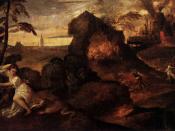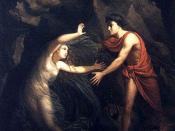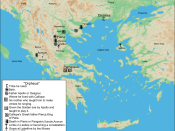According to Joseph Campbell, the artist-scientist is "curiously disinterested, almost diabolic human phenomenon, beyond the normal bounds of social judgment, dedicated to the morals not of his time but of his art. He is the hero of the way of thought-singlehearted, courageous, and full of faith that the truth, as he finds it, shall make us free"(24). Orpheus is the artist and Dædalus is the scientist. These two heroes use their crafts as a means to aiding themselves and others.
Orpheus' skill was his music. He was said to be the greatest musician who was not a god. Hamilton says, "Orpheus had no rival there [Thrace, where he grew up] or anywhere except the gods alone"(103). He had the ability to change the moods of men with his lyre and melody. With his music he had the ability to charm not only his fellow-mortals but "wild beasts were softened by his strains, and gathered around him laid by their fierceness, and stood entranced with his lay" (Bulfinch 173).
His notes softened even trees and rocks. Orpheus had also saved his fellow Argonauts. When they were approaching the island of the Sirens' and were lured there by their voices, Orpheus began playing his lyre and singing to help steer the men away from the island, which would have brought on their deaths. However great his music, he is better known for his "ill-fated marriage"(Hamilton 103). The marriage was fated to fail even from the beginning, Hymen, the god of marriage, was asked to bless the marriage with his presence and although he was present, he brought bad omens with him. His torch smoked and brought tears into their eyes. After the marriage ceremony, Eurydice, Orpheus' bride, was fleeing from the advances of Aristæus, a shepherd. During which, she came upon a...


